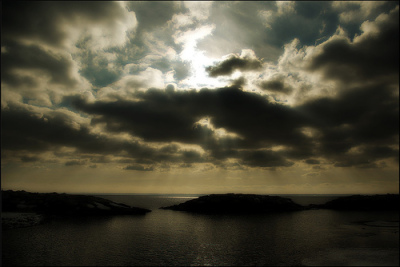IN THE BEGINNING
December 18, 2007
by: jovial_cynic
by: jovial_cynic

image: Heaven Let The Light Shine Down... (cc) PentaxFanatiK
Growing up in church, I often heard that new converts should start their Christian faith by reading through the gospel of John to get a fuller understanding of their faith. From there, they were instructed to read the rest of the gospels, as well as the book of Proverbs, because they were fairly easy to read. It was explained that the rest of the bible was more challenging, and there was no point in creating roadblocks at the beginning of their newly found faith.
I didn't question this teaching; I figured that the church leaders knew what they were doing. Years later, having come into my own understanding of the text and of the tactics some churches use to make converts, the cynical side of me believes this: if you can get people to nod at the easy things, you're going to get those same people to nod at the difficult things. By difficult, I mean the commonly taught interpretations of the text that simply make no sense. If you can get people to believe that the Bible is the Word of God, and then get them to believe that you and/or your denomination holds the keys to the proper interpretation of the text, you can get them to believe anything you say.
I propose trudging through the text head-on and confronting these difficult passages with some reason and understanding.

image: Antennae Galaxies (Public Domain)
The first chapter of Genesis* presents us with one of most heated religious debate topics: creation vs evolution. Many Christians take the seven-days-of-creation approach (rendering the universe 4 to 10 thousand years old), whereas others believe (as the field of physics states) in a 13.7 billion year old universe. Both can't be true, so one (or both) must be incorrect.
Does the bible actually teach that the universe was created and completed in a literal seven days? How do Christians hold a seven-day interpretation in one hand, and scientific evidence in the other? What are "days?" What does it mean to "create?" When is "in the beginning?" Let's pick the text apart.
In the beginning God created the heavens and the earth.
Genesis 1:1 starts off with what many pass off as a chapter heading. If this is merely a chapter heading, the line of text simply states what is going to happen throughout the rest of the chapter; it's easily glossed over. However, if it's a verse by itself, perhaps it's a good idea to see exactly what it says.
The Hebrew word from which we translate "beginning" (re'shiyth) can actually be translated in a few ways. In the NASB translation, it is rendered "beginning" 19 times throughout the Old Testament, and it is translated as "first" 16 times. However, if we check each passage we find the word and see how it is used, in almost every instance, the word "first" fits quite well.
If we replace "in the beginning" with "first" in Genesis 1:1, we have a completely different way of viewing the first verse in the bible:
First, God created the heavens and the earth.
First. That is, prior to the rest of creation. Everything after verse 1 takes place somewhere in the heavens and the earth which God created. In the midst of that single verse, there is nothing to indicate the time involved. There is no problem with a 13.7 billion year old universe. There's nothing in the text that precludes the current scientific model for how the universe came to be.
Does this interpretation work? What are the theological consequences for allowing for an ancient universe? Does this provide a stronger case for evolution?
I'll continue to explore this idea in further posts. Stay tuned.
NOTE: I've discovered an error in my translation/interpretation in this text; the correction is explained in this post.
* I set the link to point to the New American Standard Bible (NASB) translation, as it's the most literal of translations, which is more useful for studying. The literal hebrew/greek is the most ideal.

